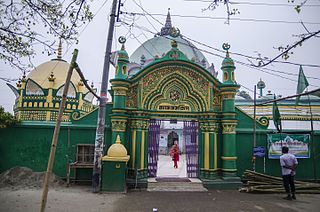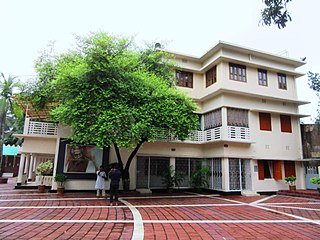
Nurul Amin was a Pakistani politician and jurist who served as the eighth prime minister of Pakistan from 7 December to 20 December 1971. His term of only 13 days as prime minister was the shortest served in Pakistani parliamentary history. He was also the only vice president of Pakistan.

The Bangla Academy is the official regulatory body of the Bengali language in Bangladesh. It is an autonomous institution funded by the Government of Bangladesh that fosters the Bengali language, literature and culture, works to develop and implement national language policy and conducts original research in Bengali. Established in 1955, it is located in the Burdwan House in Shahbagh, Dhaka, within the grounds of the University of Dhaka and Suhrawardy Udyan. The Bangla Academy hosts the annual Ekushey Book Fair.

Manikganj is a district in central Bangladesh and part of the Dhaka Division. It was established in 1845, it was a subdivision of Faridpur District until, in 1953, it was transferred to Dhaka District for administrative purposes. In 1984, Manikganj was declared a full district.

Faridpur District is a district in south-central Bangladesh. It is a part of the Dhaka Division. It is bounded by the Padma River to the northeast. The district was named for its headquarters, the city of Faridpur, which itself was named for Farīd-ud-Dīn Masʿūd, a 13th-century Sufi saint. A separate district was created by severing Dhaka district in 1786 and was called Dacca Jelalpur. A municipality was established in 1869. Historically, the town was known as Fatehabad. It was also called Haveli Mahal Fatehabad.

Sirajganj District is a district in the North Bengal region of Bangladesh, located in the Rajshahi Division. It is the 25th largest district by area and 9th largest district by population in Bangladesh. It is known as the gateway to North Bengal.
The Bangladesh Institute of Law and International Affairs (BILIA) is the oldest think tank in Bangladesh. It is housed in the former residence of Huseyn Shaheed Suhrawardy on Road 7, Dhanmondi, Dhaka.

Khandakar Abdur Rashid, better known as Abdur Rashid Tarkabagish was a Bangladeshi politician and Islamic scholar. His career spans from the anti-colonial independence movement to the establishment of both Pakistan and Bangladesh. Tarkabagish was the second president of the All Pakistan Awami Muslim League, and served as a member of the National Assembly of Pakistan and later the Parliament of Bangladesh. Despite being a member of the treasury bench, he opposed what he considered to be the repressive mentality of the Nurul Amin government towards the Bengali Language Movement.

Maulvi Tamizuddin Khan was the Speaker of Pakistan's Constituent Assembly from 1948 to 1954 and National Assembly of Pakistan between 1962 and 1963.
Yusuf Ali Chowdhury, known as Mohan Mia, was a Bengali-Pakistani politician.

Chittagong Medical College (CMC) is a public medical college located in Chittagong, Bangladesh. It was established in 1957 and it is the second oldest medical college of Bangladesh. It is also the second largest medical college hospital in Bangladesh. It is affiliated with Chittagong Medical University.
Syeda Sajeda Chowdhury was a Bangladeshi politician. She served as a Jatiya Sangsad member representing the Faridpur-2 constituency from 2008 till her death in 2022. She also served as the Environment and Forest Minister of Bangladesh during 1996–2001.

Abdul Haleem Chowdhury was a politician of the Bangladesh Nationalist Party, Member of Parliament, and government minister. He is a retired captain of Pakistan Army and fought in the Bangladesh Liberation War and established Halim Bahini. His son-in-law is Mafizul Islam Khan Kamal.

Tungipara Sheikh family of Tungipara is one of the two most prominent Bangladeshi political families, other being the Zia family. The family primarily consists of Sheikh Mujibur Rahman, Sheikh Hasina, Sheikh Rehana and their relatives. Their political involvement has traditionally revolved around the Bangladesh Awami League.

Salma Islam is a Bangladeshi lawyer, journalist, politician, and a former Jatiya Sangsad member. She was an MP of Bangladesh Jatiya Sangsad representing the Dhaka-1 constituency. She served as state minister of the Bangladesh government for Ministry of Women and Children Affairs. She is the Member of Presidium as well as current chair of Dhaka of Jatiya Party (Ershad). She has been made the new chairman of Jamuna Group after the death of her husband and the conglomerate's founder chairman Nurul Islam Babul.
Khurram Khan Chowdhury was a Bangladeshi politician who served four terms in parliament. Initially elected as a member of the Bangladesh Nationalist Party (BNP), he resigned from the BNP, joined the Jatiya Party, and later returned to the BNP.
Syed Rahmatur Rob Irtiza Ahsan was a Bangladeshi politician and a former member of parliament for Barguna-2.
Anwarul Hossain Khan Chowdhury is a founder member of Bangladesh Nationalist Party politician and the former Member of Parliament of Mymensingh-9. He was an advisor to former President Ziaur Rahman.

The Constitutional Reform Commission is a commission established by the Yunus ministry in 2024 with a purpose to prepare a report on the reasons behind past constitutional failures and to create a roadmap for holding a constituent assembly election to draft and adopt a new, inclusive, democratic constitution, ensuring the inviolability of human dignity. The commission was formed in the aftermath of a constitutional crisis triggered by the July revolution that culminated in the ousting of Sheikh Hasina on August 5, 2024.
Umran Chowdhury is a Bangladeshi lawyer, writer, surveyor, historian, and columnist. He has been a researcher at Bangladesh Institute of Law and International Affairs and the School of Oriental and African Studies. He frequently writes for the Dhaka Tribune.













